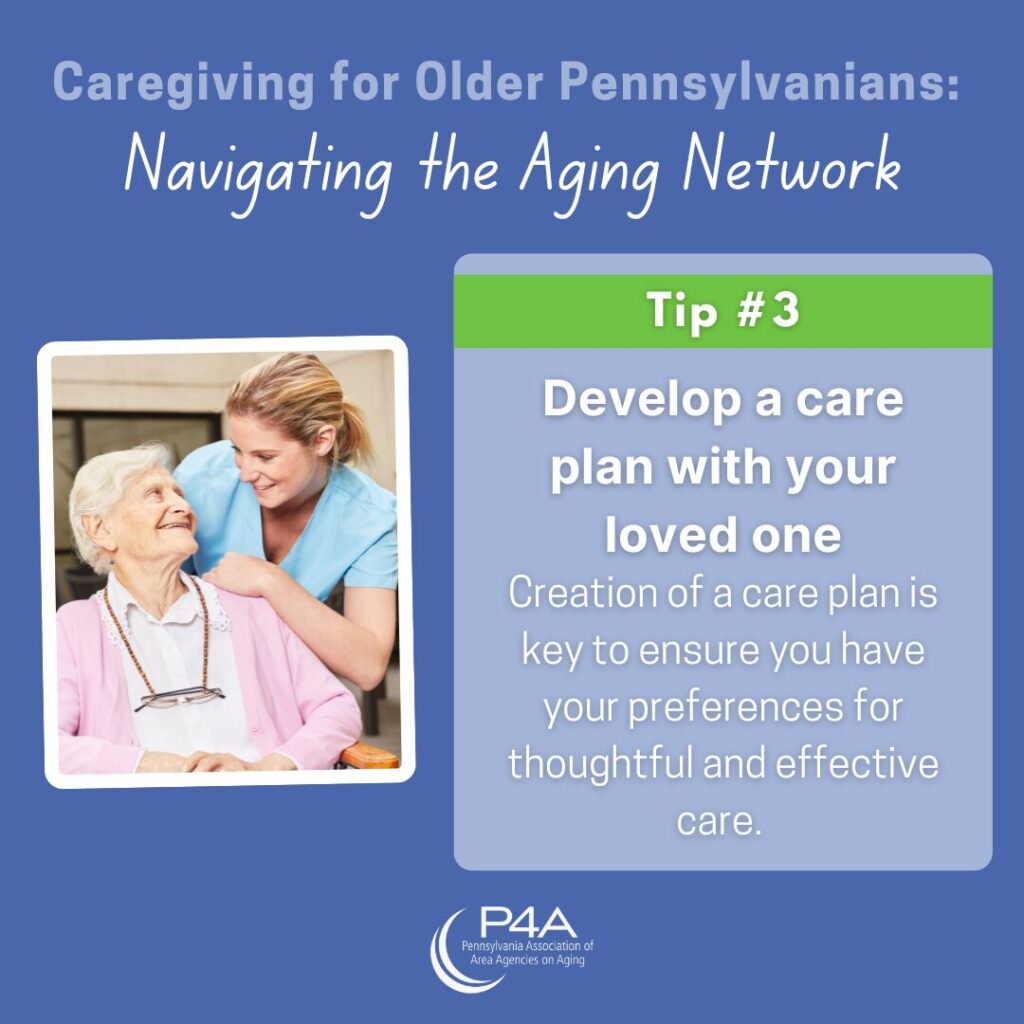Navigating the Aging Network Tip #3: Develop a Care Plan with Your Loved One’s Input
| Caregiving
This article is part of an ongoing series for caregivers of older adults in Pennsylvania, designed to help you access resources, support services, and community connections to enhance your caregiving experience.
As a caregiver for an older adult in Pennsylvania, you are not alone. The Pennsylvania Area Agencies on Aging (AAA) network is here to support you.

Navigating the Aging Network: Develop a Care Plan with Your Loved One's Input
Developing a Care Plan with Your Loved One’s Input: A Guide for Caregivers
As we continue our "Navigating the Aging Network" series, we focus on one of the most essential steps in caregiving - creating a care plan. This ensures that your loved one’s needs are met while respecting their preferences and allowing space for collaboration. Here are actionable tips to help create an effective and thoughtful care plan.
Why Is It Important to Develop a Care Plan:
1. Empowers Your Loved One
Including your loved one in the planning process gives them a sense of control over their own life. Involving them in decisions about their care can restore confidence and dignity.
2. Ensures Personalized Care
Every individual has unique needs, preferences, and values. By involving your loved one in creating the care plan, you can tailor the approach to match their specific desires—whether it’s dietary preferences, daily routines, or social activities.
3. Improves Communication
Open discussions during the planning phase strengthen trust and understanding between caregivers and seniors. This can reduce misunderstandings and make caregiving a collaborative effort rather than a unilateral decision-making process.
4. Reduces Stress for Caregivers
Knowing that your loved one is actively participating in the care plan can ease the burden of decision-making. It ensures everyone is on the same page, minimizing potential conflicts or second-guessing.
How to Develop a Care Plan with Your Loved One’s Input:
- When planning care for a loved one, start with an honest conversation in a comfortable setting. Discuss their needs, concerns, and goals, and listen actively to their thoughts and feelings.
- Assess their physical, emotional, social, and financial needs using tools like checklists or seeking professional assessments if needed. Then, work together to set short-term and long-term goals that align with their priorities.
- Create a written care plan that includes daily routines, medical appointments, and emergency contacts. Both you and your loved one should sign and date the plan, and share it with relevant family members and caregivers.
- Review and update the plan regularly to ensure it remains relevant as circumstances change. Encourage ongoing feedback to make necessary adjustments and keep the care personalized and effective.
Develop a Care Plan Today
Developing a care plan with your loved one’s input is not just about logistics—it’s about honoring their voice and allowing space for collaboration. As caregivers, the focus is on providing support for others, and taking time to involve your loved one in their decisions can transform caregiving into a partnership rather than a responsibility. By following these steps, you can create a care plan that meets both practical needs and emotional well-being.
Remember, your local Area Agency on Aging is always available to provide additional resources and support in navigating the complexities of elder care. Visit https://p4a.org/ for more information.
